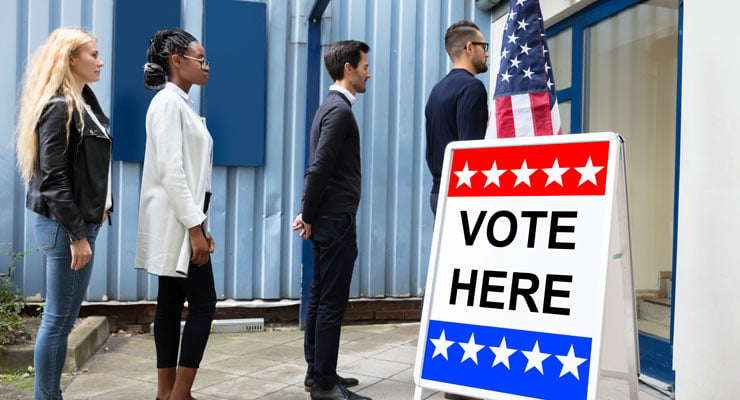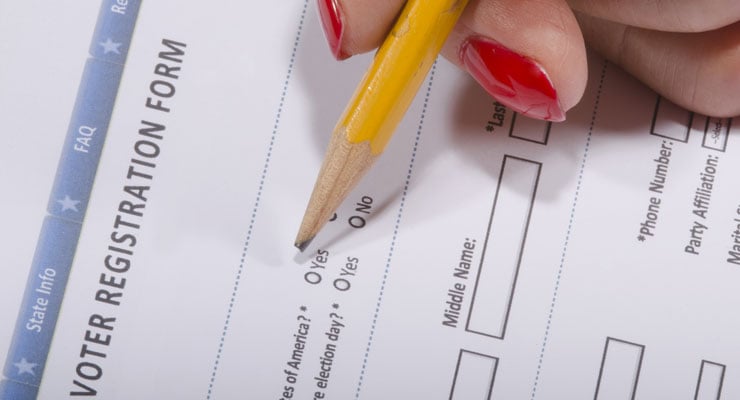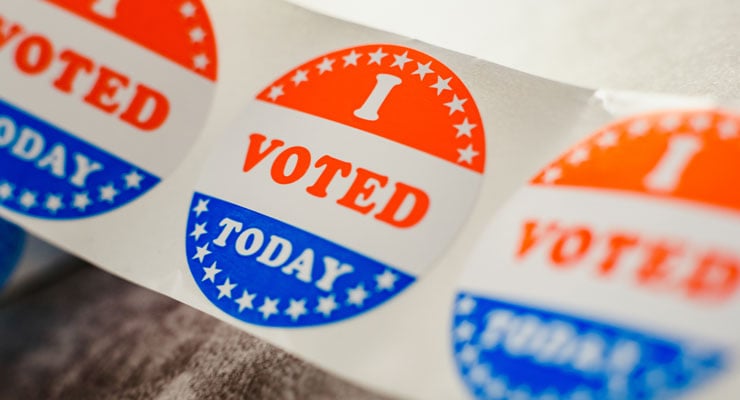College Student Voting: How to Vote While You’re in College
By Joe Emerson | Last Updated: Mar 5, 2025

“Elections belong to the people,” Abraham Lincoln said. Sure, you say, but you’re not going to bother with elections because you don’t know how to vote while you’re in college. If that’s the case, consider the rest of Lincoln’s quote: “If they decide to turn their back on the fire and burn their behinds, then they will just have to sit on their blisters.”
There’s Been an Uptick in College Student Voting
Citing U.S. Census Bureau data and a study by the Institute for Democracy & Higher Education, a Washington Post story published in September on college student voting in the 2018 midterm elections reports “a dramatic spike in political engagement that could draw unprecedented attention to these voters in next year’s presidential election.”
This trend has continued over the years. If you want to be part of that college student push to the polls, getting the answers to some common questions is a good start.
Frequently Asked Questions About Voting in College
States and localities largely determine the details of the voting process, so it’s always prudent to go to the source when you have a question.
How Do I Register to Vote?
Registration varies by state, so check with the relevant election office. In general, if you meet the registration age requirement, are a U.S. citizen, meet residency requirements, and register by the deadline, you’ll be ready for Election Day – as long as you also have the necessary ID or paperwork for voting at your specified voting location or for voting by mail.
In Hillsborough County, home to the USF Tampa campus, you can register at the supervisor of elections offices, motor vehicles offices, public assistance offices, public libraries, offices serving people with disabilities, military recruitment offices, and centers for independent living.
You can register online in 42 states and the District of Columbia (as of 2024), including Florida. Information for all locations is at your fingertips.
Where Do I Vote if I’m an Out-of-state Student?
If you are an out-of-state student, you can register to vote in your home state or your college state.
Choosing which state to register in depends on a variety of issues. Affordable Colleges Online notes that where you register determines your eligibility to vote in local elections. Other considerations are the difficulty of absentee voting in your home state when you are attending an out-of-state college and your plans after graduation.
If you need to change or update your registration, you can use the U.S. Election Assistance Commission’s National Mail Voter Registration Form to “update registration information due to a change of name, make a change of address or to register with a political party.”
How Do I Vote in My Home State if I Can’t Go Home?
You vote by absentee ballot.
According to the National Conference of State Legislatures, four states let some voters use web-based portals to log absentee ballots: Arizona, Colorado, Missouri, and North Dakota. Notably, North Dakota doesn’t require voter registration.
Mostly, though, absentee ballots must be mailed. There are two critical steps. The first step is to request a ballot from the state or locality where you are registered. The second step is to follow the rules, which vary by location.
If you’ll be studying abroad come Election Day, complete a Federal Post Card Application at FVAP.gov to request an absentee ballot.
Will Where I Register to Vote Affect My Financial Aid or My Parents’ Tax Returns?
Where you register to vote will not affect your parents’ ability to claim you as a dependent. And it won’t affect federal aid and most scholarships, but it could affect some private scholarships. Check with your financial aid office or the scholarship administrators to be sure.
Can Where I Register to Vote Affect My Tuition?
The issue here is out-of-state versus in-state rates. Best Colleges says not in most cases, but Affordable Colleges Online says it could. When in doubt, ask the school.
Pursue an Education; Stay Informed; Register; Vote
The National Center for Education Statistics says that by 2030, there will be 30.5 million college and university students in the United States. That’s a lot of potential voters. It’s also good news for those who subscribe to Thomas Jefferson’s thoughts on education and democracy.
Jefferson is often credited with saying, “An educated citizenry is a vital requisite for our survival as a free people.” He didn’t say it, but it’s a well-cut sentence and a summary of Jefferson’s thoughts on the topic.
Most schools try to accommodate voter registration and balloting, with many hosting both of the processes for the benefit of students. In fact, some degree of voter accommodation is required by law: “In accordance with the statute (1998 Reauthorization of the Higher Education Act of 1965), institutions must make a good faith effort to distribute voter registration forms and make such forms widely available to students in attendance.”
If you want to know more about USF’s role in developing an educated citizenry, the Office of Admissions is ready to engage. Contact us online, or reach us by phone at 813-974-3350.





